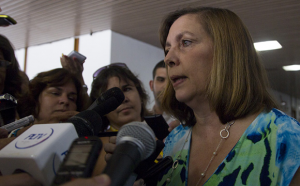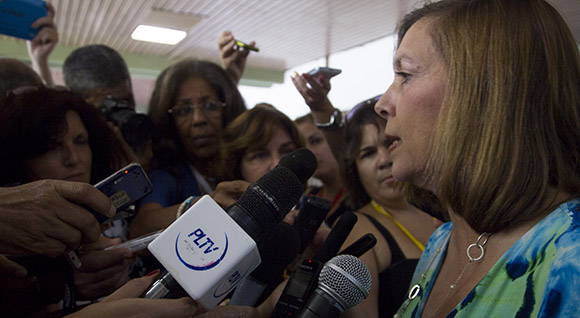
CUBA STANDARD — The first phase of U.S.-Cuba rapprochement will conclude July 20 with the opening of embassies, and a second — more difficult — phase will begin then, the head of the Cuban delegation in normalization talks told reporters after informing the National Assembly about the state of the negotiations.
The parliament is meeting in Havana for its mid-year session.
“I gave a summary to the members of the parliament about what has happened between Dec. 17 and the current moment,” said Josefina Vidal, General Director for United States of Cuba’s Foreign Relations Ministry, according to official website Cubadebate. “As you know, we’re about to conclude a first phase that will close on July 20, the day when relations between Cuba and the United States will be officially established, and when the Interests Sections of our two countries will turn into embassies.”
“That day, we will be closing this first phase of the process we have begun with the United States, and from that moment on, we will begin to work in the second phase of what we call ‘the normalization of relations’. This new phase will take time because we will have to engage at this time very complex topics that have been piling up in the course of five decades and that we have to resolve in order to be able to say one day that relations between Cuba and the United States are normal.”
Vidal told reporters that details about the Cuban embassy opening celebration in Washington on July 20 will be forthcoming. The Cuban foreign ministry announced July 1 that Foreign Minister Bruno Rodríguez will head a delegation of “distinguished members of Cuban society.”
In preparation of this second normalization phase, there have been first “specialized conversations” about human rights, telecommunications and aviation, and discussions on expanded cooperation, such as coordination on disaster response and health issues. Next on the agenda are meetings about fugitives and law enforcement, a senior U.S. State Department official said on background after the embassy announcement.
The possibly trickiest set of conversations will be on claims, including U.S. claims regarding properties seized after the Revolution, and Cuban claims for monetary compensation to pay for the damage inflicted by U.S. sanctions.
“We also have agreed to have conversations and a discussion about claims and – on each side, whether it’s expropriation or property claims or the Cuban Government’s claims against the United States for damages under the embargo,”the official said, answering a reporter’s question.
As of now, Cuba seems to be insisting on the lifting of all U.S. sanctions as a precondition to settle these issues, which could take years, as the Republican-led U.S. Congress is resisting President Barack Obama’s rapprochement with Cuba.
“There can’t be any normal relations between Cuba and the United States while the strictly enforced economic, trade and financial blockade produces damage and shortages to the Cuban people,” the Cuban foreign ministry said in a statement on July 1. “It’s the main obstacle to the development of our economy, it constitutes a violation of international law, and it affects the interests of all countries, including the United States.”

